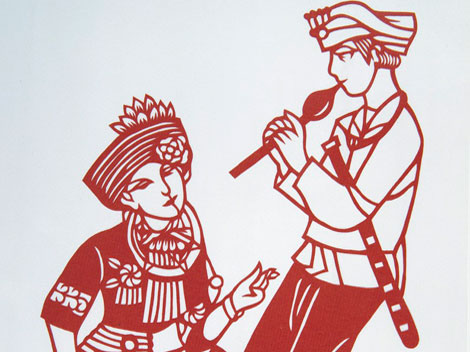

The most important myth of the Achang is that of Zhepama and Zhemima that depicts the origin of the world and the first human beings in it.
In its primal state the world was a mass of air in chaos. The first thing that appeared was light, and after it, darkness. From the interaction between light and darkness Zhepama, the Celestial Father, and Zhemima, the Earthly Mother, arose.
In the void that existed after their creation, Zhepama, with the help of a magic whip, started the creation of the sky. Later he created the sun and the moon. He pulled up his breast (for that reason men don't have them) to make two high mountains, where he placed the sun and the moon. Between these two mountains he made a tree in such a way that the sun and the moon follow each other continuously. When you see the sun it is day time, if you see the moon, it is night time. Then he created the clouds, the stars and all that there is in the sky.
Next Zhemima knitted the earth. With the hair of her face and a lot of love, Zhemima created the earth of the east, of the south, of the west and of the north. Zhemima bled, and of her blood the seas that surround the earth were created. Then, of her flesh she made a great ship, on which rests the earth. But the earth was bigger than the sky, which could not cover it completely. Then Zhemima caused an earthquake and the mountains arose, and the sky was them adjusted perfectly to the earth.
Then Zhepama and Zhemima come to know each other, and of the admiration that each one felt for the work of the other arises love and the desire to create somebody to govern this world. After asking the nature, they decided to marry. After nine married years Zhemima gave birth to a pumpkin seed that grew until it become an enormous tree which blossomed into a single flower. This flower still took nine more years to produce a pumpkin that grew and grew, threatening to explode the world. Then Zhepama gave a lash with his magic whip, making a hole in the pumpkin, from which nine children emerged. Zhepama and Zhemima taught the children the proper tasks of each sex. These nine children are the ancestors of all the nations.
One day a flood occurred. Zhepama requested Zhemima to sew the world. She put to sew it for the east, the north and the west. To cover the south, Zhepama, with his generals, built a great wall and a door, called the Southern Gate of the Heaven. Those living in the south requested Zhepama not to abandon them, and especially the Goddess of Salt, with whom he ended marrying.
While Zhepama lived in the south, the Demon of Drought appeared in the world, spreading desolation everywhere. He placed a sun in the sky that didn't move, burning everything. There was no more day and night, and everything was in disorder. Zhemima could not destroy the Demon of Drought; she could only wait for the return of Zhepama. But Zhepama, knowing nothing about what was happening in the north, continued living happily in the south. In view of the desperate situation of Zhemima a cat offered to leave in search of Zhepama. After a long journey the cat arrived in the south, and informed Zhepama of the happening in the north.
After promising humanity that the peoples of the south and the north will remain in communication with each other, Zhepama left for the north. There, he challenged the Demon of Drought to measure their magic powers, agreeing that the winner will be the master of the world. The Demon of Drought dried a peach tree with a fire ray, asking: "who is not afraid of death?"
"The one who loves life doesn't fear death", Zhepama answered, while, launching a column of water, caused the tree to grow green again.
Then they held a contest of dreams. The one who had a nightmare would be the loser. During two nights Zhepama had beautiful dreams, while the Demon of Drought dreamt nightmares of his defeat.
He recognized his defeat.
Zhepama offered to eat with the Demon of Drought, and Zhemima put poison in his food. The demon died. Zhepama cut him up and threw him into a well.

Presented by Chinadaily.com.cn Registration Number: 10023870-7
Copyright © Ministry of Culture, P.R.China. All rights reserved